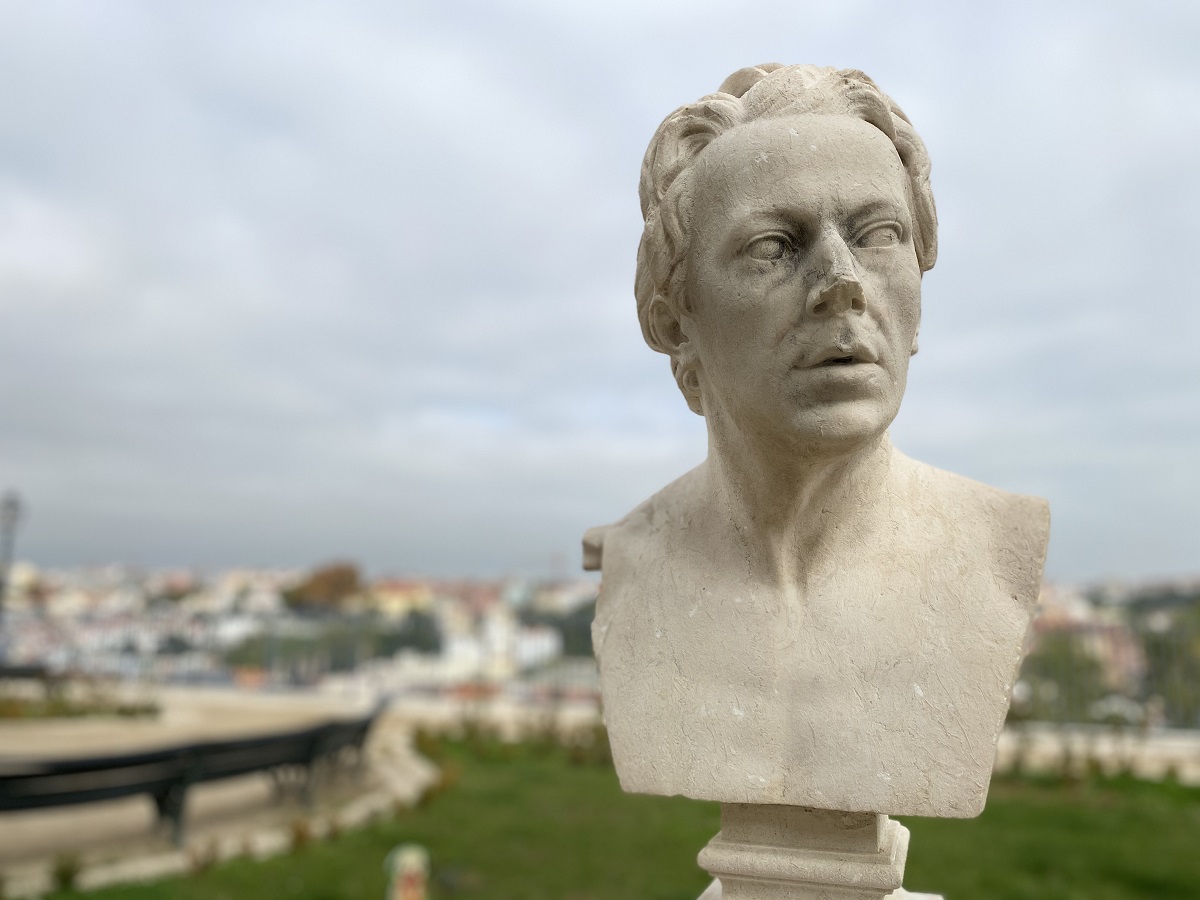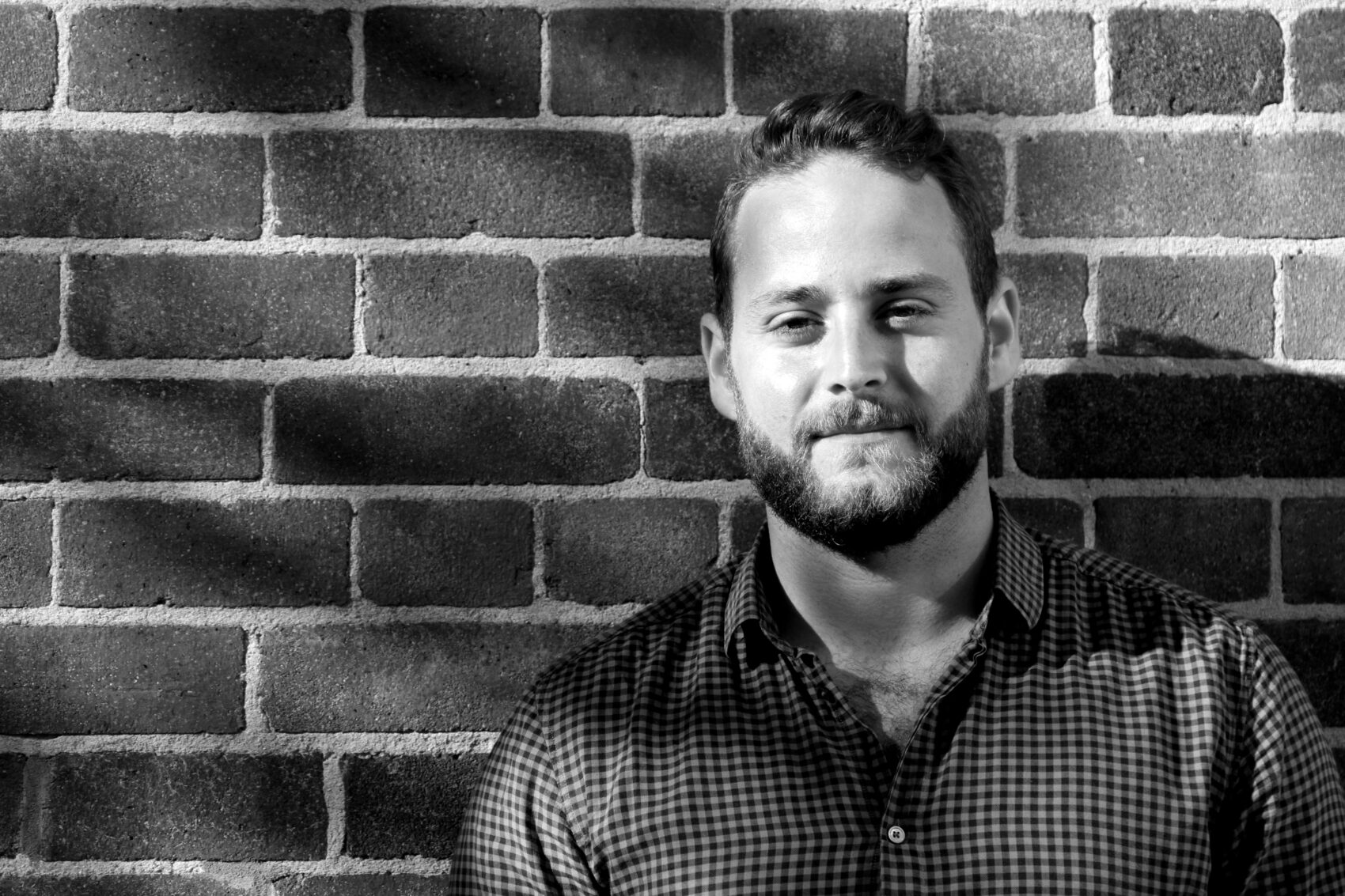Garden of Gods
During lunch hours I take my dog Luna to the Jardim de São Pedro de Alcântara, a geometrically designed garden folded into the underbelly of the main lookout point in Principe Real. The small garden is composed of a series of manicured lawns with lush vegetation of wild garlic and flowerbeds, surrounded by the stone busts of Roman and Greek gods. With my back to the gardens, I have panoramic views over the eastern neighbourhoods of the city and the still waters of the Tejo River.
I moved to Lisbon from London three years ago, a desire to escape the politics of post-Brexit Britain and to find some solace from my own internal turmoil. With plans to stay for only a few months, I somehow found myself regularly extending my stay. I read Fernando Pessoa, took solace in my dreams, and over time found myself folding myself inside this quiet city overlooking the Atlantic ocean. Late last year, my lover and I made the decision to move to Beirut, a move that we had been considering for years but which cemented itself during the revolutionary protests that gripped Lebanon in late 2019. But we did not foresee what 2020 had in store, not just for Beirut but for the whole world, and our plans changed.
To be in a city in 2020 is to witness the slow draining of life from its streets. In Lisbon today, the city is nearly devoid of tourists. Nearly half of hospitality businesses are considering insolvency. In the small garden, I toss a yellow ball above the stone heads of Minerva and Ulysses, and as Luna chases it I dream of other cities I love: of London, of Beirut. I know that life has drained from those cities too, but it is impossible to picture their emptiness. I recall hundreds of thousands of bodies pressing against each other in the streets of Beirut only a year ago, my own body among them, pulsing to the chants, melting with the sweaty bodies of those around me. I recall with perfect clarity the feel of the summer rain on my skin at Lovebox festival in Victoria Park, surrounded by friends as the first wave of ecstasy-induced euphoria rushes through my body. I know that neither the revolution nor the festival exist anymore, in this year at least, but in my mind they are still happening, if not in this world then surely another one, where better decisions were made.
For now, I walk my dog in this shrunken world, among the stone heads of the Greek and Roman gods. I toss the yellow ball through the field of wild garlic and watch Luna, my moon, dart through the shrubs and trees. Ahead of us, the city lies in an expanse, hollowed but still alive, the heart still beating, however softly.
Göttergarten
In der Mittagspause gehe ich mit meinem Hund Luna in den Jardim de São Pedro de Alcântara, einen geometrisch gestalteten Garten direkt unterhalb des wichtigsten Aussichtspunktes im Príncipe-Real-Viertel. In dem kleinen Garten gibt es mehrere gepflegte Rasenflächen mit üppigem Bärlauch und Blumenbeeten, die von Steinbüsten römischer und griechischer Götter eingerahmt werden. Mit dem Rücken zum Garten habe ich einen Panoramablick über den Osten der Stadt und das ruhige Wasser des Tejo.
Ich zog vor drei Jahren von London nach Lissabon – aus dem Wunsch heraus, der Brexit-Politik Großbritanniens zu entkommen und Trost für meine eigene innere Unruhe zu finden. Da ich anfangs nur ein paar Monate bleiben wollte, verlängerte ich meinen Aufenthalt irgendwie ständig. Ich las Fernando Pessoa, fand Trost in meinen Träumen, und mit der Zeit fand ich mich in dieser ruhigen Stadt mit Blick auf den Atlantik wieder. Ende letzten Jahres trafen mein Geliebter und ich die Entscheidung, nach Beirut zu ziehen. Wir hatten über diesen Schritt seit Jahren nachgedacht, aber er festigte sich erst mit den revolutionären Protesten im Libanon. Wir konnten nicht ahnen, was 2020 bringen würde, nicht nur für Beirut, sondern für die ganze Welt. Und unsere Pläne änderten sich.
2020 in einer Stadt zu sein, bedeutet zu sehen, wie das Leben langsam aus den Straßen verschwindet. In Lissabon sind heute fast keine Touristen. Fast das halbe Gastgewerbe denkt an Insolvenz. In dem kleinen Garten werfe ich einen gelben Ball über die steinernen Köpfe von Minerva und Odysseus, und während Luna ihm nachjagt, träume ich von anderen Städten, die ich liebe: von London, von Beirut. Ich weiß, dass auch aus ihnen das Leben verschwunden ist, kann mir ihre Leere aber unmöglich vorstellen. Ich erinnere mich an Hunderttausende Körper, die sich noch vor einem Jahr in den Straßen Beiruts aneinanderpressen. Darunter mein eigener Körper, der zu den Gesängen pulsiert und mit den verschwitzten Körpern der Menschen um mich herum verschmilzt. Ich erinnere mich mit vollkommener Klarheit an das Gefühl des Sommerregens auf meiner Haut beim Lovebox Festival im Victoria Park. Ich bin unter Freunden, als die erste Ecstasy-Welle der Euphorie durch meinen Körper rauscht. Ich weiß, dass es weder die Revolution noch das Festival mehr gibt, zumindest nicht dieses Jahr. Aber in meinem Kopf finden sie statt – wenn nicht in dieser Welt, dann sicher in einer anderen, in der bessere Entscheidungen getroffen wurden.
Vorerst gehe ich mit meinem Hund in dieser geschrumpften Welt zwischen den steinernen Köpfen der griechischen und römischen Götter spazieren. Ich werfe den gelben Ball in den Bärlauch und beobachte, wie Luna, mein Mond, durch die Sträucher und Bäume huscht. Vor uns liegt die Stadt in all ihrer Weite, leer, aber immer noch lebendig, das Herz schlägt noch, wenn auch leise.
Übersetzung: Iris Thalhammer
حديقة الآلهة
خلال ساعات الغذاء، أذهب مع كلبتي لونا إلى حديقة ساو بيدرو دي القنطرة، المصمّمة بطريقة هندسيّة والمسترسلة تحت المطلِّ الرّئيسيّ في برينسيبي ريال. تتكوّن الحديقة الصّغيرة من مساحات خضراء ذات عشب مشذّب تعجّ بنباتات نضِرة من زهور الثّوم البرّي وشتّى أنواع الأزهار، وتحيط بها تماثيل نصفيّة من الحجر لآلهة رومانيّة وإغريقيّة. وحين أدير ظهري للحديقة، تنفرد أمامي بانوراما الأحياء الشّرقية للمدينة والمياه السّاكنة لنهر تاجة.
انتقلت من لندن إلى لشبونة منذ ثلاث سنوات رغبةً في الهروب من التّداعيات السّياسية للبريكسيت في بريطانيا وبحثاً عن ملاذٍ من اضطراباتي الدّاخلية. كنت أنوي في البداية أن أمكث بضعة أشهر، إلّا أنّني وجدت نفسي أمدّد إقامتي مرّة بعد أخرى. قرأت فرناندو بيسوا ووجدت السّلوى في أحلامي. ومع مرور الوقت رأيتني أرتمي في أحضان هذه المدينة الهادئة المطلّة على المحيط الأطلسيّ. في أواخر السّنة المنصرمة، قرّرت مع حبيبي الانتقال إلى بيروت وهو أمر كنّا نفكّر فيه لِسنين وتبلور أثناء المظاهرات في الثّورة التي عاشها لبنان في أواخر 2019. غير أنّنا لم نتوقّع ما كانت تُخبّئه لنا سنة 2020، ليس لبيروت فحسب بل للعالم أجمع. فكان من الطّبيعي أن تتغيّر خطّتنا.
أن تعيش في مدينة في عام 2020 يعني أن تشهد الاستنفاد البطيء للحياة من طرقاتها. لشبونة اليوم مدينة خالية تقريباً من السّياح. وما يقارب نصف شركات الفندقة والضّيافة على وشك الإعلان عن إفلاسها. في الحديقة الصّغيرة، أرمي بكرةٍ صفراء فوق رؤوس مينيرفا وأوليس، وبينما تلاحقها لونا أحلم بالمُدن الأخرى التي أحبّها: لندن وبيروت. أعلم أنّ الحياة قد هجرت تلك المدن أيضاً ولكنّه يستحيل تصوّر مدى قفرها. أتذكّر مئات الآلاف من الأجساد المتراصّة في شوارع بيروت منذ أقلّ من سنة وجسدي بينهم ينبض على إيقاع الهتافات وينصهر مع الأجساد المتصبّبة عرقاً من حوليّ. أتذكر بوضوح تامّ الإحساس الذي تركه مطر الصّيف على بشرتي في مهرجان لوفبوكس في حديقة فيكتوريا محاطاً بأصدقائي، بينما أحسّ بموجات النّشوة الأولى التي تُحدثها الإكستاسي في جسمي. أعلم أنّ الثّورة والمهرجان لم يعد لهما وجود على الأقلّ في هذه السّنة. ولكنّ أحداثهما لا تزال تجري في ذهني، إن لم يكن في هذا العالم ففي عالم آخر حتماً، عالم اتُّخذت فيه قرارات أفضل.
في الوقت الرّاهن، أُنزّه كلبتي في هذا العالم المتقلّص، ما بين الرّؤوس الحجريّة للآلهة الإغريقيّة والرّومانية. أرمي بالكرة الصّفراء باتّجاه حقل أزهار الثّوم البرّي وأتأمّل لونا، قمري، تندفع كالسّهم متخلّلة الشّجيرات والأشجار. تمتدّ أمامنا المدينة، خاوية لكنّها لاتزال حيّة، وقلبها لايزال ينبض وإن بهدوء.
ترجمة: عبلة منوّر
Jardim dos Deuses
Durante o almoço, levo minha cadela Luna até o Jardim de São Pedro de Alcântara. Com seu desenho geométrico, ele está localizado logo abaixo do miradouro do Jardim do Príncipe Real. Esse pequeno jardim é composto de uma série de gramados bem cuidados, com uma vegetação exuberante de alho-selvagem e canteiros de flores rodeados por bustos de pedra que representam os deuses gregos e romanos. De costas para o jardim, tenho uma vista panorâmica dos bairros do leste da cidade e das águas plácidas do Rio Tejo.
Eu me mudei de Londres para Lisboa há três anos, tentando escapar da política britânica pós-Brexit e encontrar consolo diante dos meus próprios conflitos internos. Meu plano era ficar somente alguns meses, mas fui prolongando minha estadia. Li Fernando Pessoa, busquei conforto nos meus sonhos e, com o passar do tempo, me reencontrei comigo mesmo nesta cidade pacata com vista para o Oceano Atlântico. No fim do ano passado, eu e meu namorado decidimos nos mudar para Beirute, algo em que já pensávamos fazer há anos, e tornou-se um plano mais sólido durante as manifestações revolucionárias que tomaram o Líbano no fim de 2019. Porém, não prevíamos o que 2020 tinha reservado – não só para Beirute, mas para o mundo inteiro -, então tivemos que mudar de planos.
Morar no meio urbano em 2020 significa testemunhar a vida sendo drenada das ruas. Hoje, Lisboa é uma cidade praticamente sem turistas. Quase metade do ramo de hotelaria está pensando em declarar falência. No pequeno jardim, jogo uma bolinha amarela acima das cabeças de Minerva e Ulisses para Luna ir buscar, enquanto sonho com outras cidades que amo: Londres e Beirute. Sei que a vida também foi drenada das ruas dessas cidades, mas é impossível imaginá-las vazias. Eu me lembro dos milhares de corpos (incluindo o meu) se acotovelando nas ruas de Beirute há apenas um ano, pulsando ao ritmo das cantorias e derretendo de suor. Eu me lembro com extrema clareza de sentir a chuva de verão na minha pele durante o festival Lovebox no Parque Victoria; lá estava eu, rodeado de amigos, enquanto a primeira onda de euforia abastecida pelo ecstasy corria pelas minhas veias. Sei que a revolução e o festival já não existem mais, pelo menos neste ano. Porém, ambos ainda estão acontecendo na minha lembrança; se não nesta dimensão, certamente em outra, na qual foram tomadas decisões mais acertadas.
No momento, passeio com minha cadela pelos bustos dos deuses gregos e romanos neste mundo encolhido. Jogo a bolinha amarela pelos campos de alho-selvagem e observo Luna, minha lua, correndo por entre arbustos e árvores. Diante de nós está a vastidão de uma cidade vazia, porém ainda viva, cujo coração continua batendo, mesmo que mais brandamente.
Tradução: Rafa Lombardino
Share
-
28 Dienstag
Buchpremiere: »Guapa«
Lesung: Saleem Haddad
Moderation: Antje Rávic Strubel -
15 Freitag
EMPFINDLICHKEITEN: HOMOSEXUALITÄTEN UND LITERATUR (II)
Internationales Festival mit Ausstellung, Gesprächen, Texten, Performances und Musik
Veranstaltungen mit Saleem Haddad
2017
März
2016
Juli












